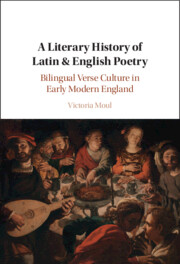Book contents
- A Literary History of Latin & English Poetry
- A Literary History of Latin & English Poetry
- Copyright page
- Dedication
- Contents
- Figures
- Acknowledgements
- Abbreviations
- Introduction
- Part I Shorter Verse
- Chapter 1 Anglo-Latin ‘Moralizing Lyric’ in Early Modern England
- Chapter 2 Metrical Variety and the Development of Latin Lyric Poetry in the Latter Sixteenth Century
- Chapter 3 Buchanan, Beza and the Genre of the Sidney Psalter
- Chapter 4 Formal Panegyric Lyric in England, 1550–1650
- Chapter 5 Abraham Cowley and Formal Innovation
- Chapter 6 Religious and Devotional Epigram and Lyric
- Chapter 7 Epigram Culture and Literary Bilingualism in Early Modern England
- Chapter 8 Satire, Invective and Humorous Verse
- Part II Longer Verse
- Afterword
- Metrical Appendix: Latin Metres
- Bibliography A: Manuscripts
- Bibliography B: Early Printed Books
- Bibliography C: Secondary Literature
- Index
Chapter 5 - Abraham Cowley and Formal Innovation
Verse Sequences, Inset Lyrics, Pindarics and Free Verse
from Part I - Shorter Verse
Published online by Cambridge University Press: 23 June 2022
- A Literary History of Latin & English Poetry
- A Literary History of Latin & English Poetry
- Copyright page
- Dedication
- Contents
- Figures
- Acknowledgements
- Abbreviations
- Introduction
- Part I Shorter Verse
- Chapter 1 Anglo-Latin ‘Moralizing Lyric’ in Early Modern England
- Chapter 2 Metrical Variety and the Development of Latin Lyric Poetry in the Latter Sixteenth Century
- Chapter 3 Buchanan, Beza and the Genre of the Sidney Psalter
- Chapter 4 Formal Panegyric Lyric in England, 1550–1650
- Chapter 5 Abraham Cowley and Formal Innovation
- Chapter 6 Religious and Devotional Epigram and Lyric
- Chapter 7 Epigram Culture and Literary Bilingualism in Early Modern England
- Chapter 8 Satire, Invective and Humorous Verse
- Part II Longer Verse
- Afterword
- Metrical Appendix: Latin Metres
- Bibliography A: Manuscripts
- Bibliography B: Early Printed Books
- Bibliography C: Secondary Literature
- Index
Summary
Abraham Cowley’s 1656 Poems is one of the landmark volumes of the seventeenth century. Less studied than Milton’s 1645 Poems, it was markedly more influential: both the Pindarique Odes and the Davideis inaugurated or revived major literary trends. Anyone reading widely in fashionable verse, especially religious and devotional lyric of the later seventeenth and early eighteenth century is struck by the vogue for increasingly loose Pindarics, a trend attributed directly to Cowley; and the Davideis is often cited as a precursor for Paradise Lost. This chapter argues that while the influence of the 1656 volume is undeniable, its formal originality has been overstated by critics who have taken Cowley’s self-conscious remarks on this topic at face-value, and have not considered the extent to which the volume successfully imported into English verse a range of formal features already well established in contemporary Latin poetry. By placing Cowley’s volume back into the bilingual literary context from which it emerged, we can reassess both Cowley’s claims to formal innovation, and how those formal features were understood by his contemporaries.
Keywords
- Type
- Chapter
- Information
- A Literary History of Latin & English PoetryBilingual Verse Culture in Early Modern England, pp. 183 - 222Publisher: Cambridge University PressPrint publication year: 2022



